Unit2, Book4 导学案
高二英语选修B2 U2导学案

Unit2Improving yourselfSectionⅠStarting out&Understanding ideas重点短语:1.be persuaded to do被说服去做2.switch on开(电灯、机器等)3.on reflection经过慎重思考4.update one's profiles更新某人的概况5.miss out错失取乐(或获利等)的机会6.go round to访问,参观;拜访7.be up to正在干,从事着8.to be honest老实说,说实在的9.check out从(旅馆)结账离开;检查;10.throw in the towel认输11.resist doing(sth.)抵制做某事的诱惑12.social media accounts社交媒体账户13.catch up on了解(已发生的事)14.other than除...以外15.rely on依赖,依靠16.step away from远离Language Points1.(p18)教材原句p.14At the start of the detox,over100students had been persuaded to stop using social media...脱瘾活动初期,我们成功说服100多名学生不得使用社交媒体……be persuaded to do sth.被说服做某事He was persuaded to lay aside his own business and help the librarian to sort out the books.他被说服放下自己的工作,帮助图书馆管理员整理书籍。
[词汇复现]【归纳拓展】persuade sb.to do/into doing sth.说服某人做某事persuade sb.not to do/out of doing sth.说服某人不要做某事persuade sb.of sth.使某人相信某事persuade sb.that...使某人相信……【误区警示】persuade“说服”,强调劝说的结果;advise“建议”,强调劝说的动作。
新视野英语教程教案book4Unit2
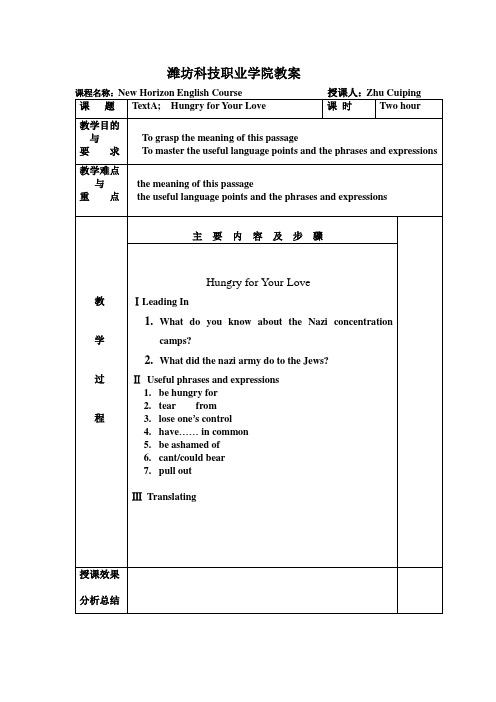
潍坊科技职业学院教案Text A Hungry for Your LoveI Detailed Study of the TextA1. I am almost dead, surviving from day to day, from hour to hour, ever since I was taken from my home and brought here with tens of thousands of other Jews.from day to day: day by day; as time goes on 一天天地;日益地The symptoms changed from day to day.症状一天天在发生变化。
The problem is getting worse from day to day.这个问题变得一天比一天糟。
from hour to hour: (of something) changing very quickly and very often (变化)快速不断地;每小时都有地The weather conditions in these mountains change from hour to hour.山间的天气情况时时在变。
2. I want to look away, oddly ashamed for this stranger to see me like this but I cannot tear my eyes from hers.Meaning:The girl, who is a stranger, looks at me like this, which shames me in a strange way. But I cannot move my eyes away from hers; I just cannot stop looking at her.oddly:adv. in a strange or peculiar manner 奇怪地;古怪地Mary looked at Tom very oddly.玛丽怪模怪样地看着汤姆。
新标准大学英语BOOK4-unit2教案-李骠
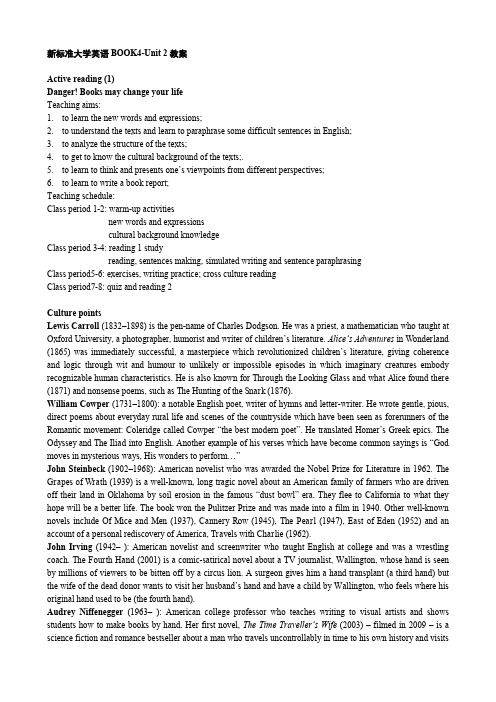
新标准大学英语BOOK4-Unit 2教案Active reading (1)Danger! Books may change your lifeTeaching aims:1.to learn the new words and expressions;2.to understand the texts and learn to paraphrase some difficult sentences in English;3.to analyze the structure of the texts;4.to get to know the cultural background of the texts;.5.to learn to think and presents one’s viewpoints from different perspectives;6.to learn to write a book report;Teaching schedule:Class period 1-2: warm-up activitiesnew words and expressionscultural background knowledgeClass period 3-4: reading 1 studyreading, sentences making, simulated writing and sentence paraphrasingClass period5-6: exercises, writing practice; cross culture readingClass period7-8: quiz and reading 2Culture pointsLewis Carroll (1832–1898) is the pen-name of Charles Dodgson. He was a priest, a mathematician who taught at Oxford University, a photographer, humorist and writer of children’s literature. Alice’s Adventures in Wonderland (1865) was immediately successful, a masterpiece which revolutionized children’s literature,giving coherence and logic through wit and humour to unlikely or impossible episodes in which imaginary creatures embody recognizable human characteristics. He is also known for Through the Looking Glass and what Alice found there (1871) and nonsense poems, such as The Hunting of the Snark (1876).William Cowper (1731–1800): a notable English poet, writer of hymns and letter-writer. He wrote gentle, pious, direct poems about everyday rural life and scenes of the countryside which have been seen as forerunners of the Romantic movement: Coleridge called Cowper “the best modern poet”. He translated Homer’s Greek epics. The Odyssey and The Iliad into English. Another example of his verses which have become common sayings is “God moves in mysterious ways, His wonders to perform…”John Steinbeck (1902–1968): American novelist who was awarded the Nobel Prize for Literature in 1962. The Grapes of Wrath (1939) is a well-known, long tragic novel about an American family of farmers who are driven off their land in Oklahoma by soil erosion in the famous “dust bowl” era. They flee to California to what they hope will be a better life. The book won the Pulitzer Prize and was made into a film in 1940. Other well-known novels include Of Mice and Men (1937), Cannery Row (1945), The Pearl (1947), East of Eden(1952) and an account of a personal rediscovery of America, Travels with Charlie (1962).John Irving (1942–): American novelist and screenwriter who taught English at college and was a wrestling coach. The Fourth Hand (2001) is a comic-satirical novel about a TV journalist, Wallington, whose hand is seen by millions of viewers to be bitten off by a circus lion. A surgeon gives him a hand transplant (a third hand) but the wife of the dead donor wants to visit her husband’s hand and have a child by Wallington, who feels where his original hand used to be (the fourth hand).Audrey Niffenegger (1963–): American college professor who teaches writing to visual artists and shows students how to make books by hand. Her first novel, The Time Traveller’s Wife (2003) – filmed in 2009 – is a science fiction and romance bestseller about a man who travels uncontrollably in time to his own history and visitshis wife in her childhood, youth and old age. His wife needs to cope with his absences and dangerous life while he travels. The story is a metaphor for distance and miscommunication in failed relationships.Paul Torday (1946– ): a British busines sman who worked for a company that repaired ship’s engines for many years. Salmon Fishing in the Yemen (2007) was his first novel. It is a political satire and comedy about a dull civil servant who becomes involved in a plan to populate the desert with Scottish salmon. Politicians manage the media to “spin” this as a plan they support in order to divert attention from problems in the Middle East. There are themes of cynicism and belief, and East-West culture clashes.Aleksandr Solzhenitsyn (1918–2008): a Russian writer who was imprisoned in Soviet labour camps in 1945; after eight years, he was exiled to Kazakhstan and not freed until 1956, when he became a teacher. In 1970 he was awarded the Nobel Prize for Literature but not receive it until 1974. He went to Germany, Switzerland and the USA, returning to Russia in 1994. His best known novels were based on his experiences as a prisoner and include: One Day in the Life of Ivan Denisovich (1962), Cancer Ward (1968), The Gulag Archipelago (1974–1978). His later works were about Russian history and identity.Graham Greene (1904–1991): a British novelist, short-story writer, playwright, travel writer and essayist. He wrote a number of thrillers (he called them ‘entertainments’) which dramatize an ambiguous moral dilemma, often revealing guilt, treachery, failure and a theme of pursuit. Greene was also a film critic and all of these novels have been made into films: Brighton Rock (1938), The Power and the Glory (1940), The Heart of the Matter (1948), The Third Man (1950), The Quiet American (1955), and Our Man in Havana (1958).E. M. Forster (1879–1970): a British novelist and writer of short stories and essays. He lived at different periods in Italy, Egypt and India and taught at Cambridge University. His best known novels include A Room with a View (1908), Howard’s End (1910), A Passage to India (1924) which have all been made into films. His writing about reading and writing includes a book of lectures, Aspects of the Novel (1927).Thomas Merton (1915–1968): an American Catholic writer, who was a Trappist monk in Kentucky. He wrote over 70 books, including many essays about Buddhism and a translation into English of the Chinese classic, Chuang Tse. He had a great deal to say about the meeting of Eastern and Western cultures and wrote many letters to writers, poets, scholars and thinkers. He read a lot in English, Latin, French and Spanish and said he always had at least three books which he was reading at any one time.William Blake (1757–1827): a British poet, artist and mystic, who read widely in English, French, Italian, Latin, Greek and Hebrew. He made many engravings to illustrate the work of such writers as Virgil, Dante and Chaucer, as well as his own poems. He stressed that imagination was more important than rationalism and the materialism of the 18th century and criticized the effects of the industrial revolution in England, but his work was largely disregarded by his peers. He is best known for his poetry in Songs of Innocence (1787) and Songs of Experience (1794). His belief in the oneness of all created things is shown in his much-quoted verse, “To see the world in a grain of sand / And a heaven in a flower, / Hold infinity in the palm of your hand / And eternity in an hour.”Clifton Fadiman (1904–1999): an American writer, radio and TV broadcaster and editor of anthologies. For over 50 years he was an editor and judge for the Book-of-the-Month Club. In 1960 he wrote a popular guide to great books for American readers, The Lifetime Reading Plan, which discusses 133 authors and their major work: the 1997 edition includes 9 authors from China.J. K. Rowling (1965–): British writer of the seven Harry Potter fantasy books. She studied French and Classics at Exeter University, before teaching English in Portugal and training to teach French in Scotland. The main idea about a school for wizards and the orphan Harry Potter came on a delayed train journey from Manchester to London in 1990. She began to write as soon as she reached London. Twelve publishersrejected the first book before Bloomsbury, a small London publisher, agreed to publish it. Later books have repeatedly broken all the sales records (as have some of the films). She is one of the richest women in the UK and a notable supporter of many charities.Language points1 Variety’s the very spice of life, / That gives it all its flavour … (Para 2)Spices are made from plants and added to food to give it its particular flavour or taste. The English proverb “Variety is the spice of life” (the proverb comes from Cowper’s poem) therefore means that variety gives life extra value and allows you to appreciate life in particular ways.2 We learn to look beyond our immediate surroundings to the horizon and a landscape far away from home. (Para 3)This means that through reading we learn to look beyond our immediate experience or familiar environment to things beyond our immediate experience, ie to completely different things that we can imagine and experience through books.3 When a baseball player hits a home run he hits the ball so hard and so far he’s able to run round thefour bases of the diamond, and score points not only for himself but for the other runners alreadyon a base. (Para 9)In the American game of baseball, the field of grass is diamond-shaped and has four bases (specific points marked around the diamond), round which players must run to score points. One team bats (ie team members take turns to hit the ball and run round the bases) and the members of the other team throw (pitch) the ball and, when it is has been hit, try to catch it or get it quickly to one of the four bases. If a batting player can hit the ball hard enough, he can run round all four bases before the other team can get the ball and thus score maximum points – with a home run. In the passage, a really good book is a home run.3 Choose the best answer to the questions.1 Why are we like Alice in wonderland when we read a book?(a) Because, like Alice, we often have accidents.(b) Because reading makes us feel young again.(c) Because reading opens the door to new experiences.(d) Because books lead us into a dream world.2 According to the writer, what is the advantage of reading over real life?(a) There is more variety in books than in real life.(b) We can experience variety and difference without going out of the house.(c) The people we meet in a book are more interesting than real people.(d) It’s harder to make sense of real life than a book.3 What do the seven novels listed in Paragraph4 have in common?(a) Their titles stimulate imagination.(b) They represent the best writing by British and American novelists.(c) They have become classics.(d) You can find all of them in any local library.4 At what moment in our lives do books become important?(a) As soon as we start reading.(b) When we start buying books to fill our shelves at home.(c) When we start listening to bedtime stories.(d) Only when we are ready for books.5 What claim did Merton make about the poems of William Blake?(a) They were similar to the works of the Greek writers and thinkers.(b) They helped him understand the meaning of life.(c) They created a sense of confusion.(d) They taught him a lot about modern culture.6 What is meant by a home-run book?(a) A book which is so good you are unable to put it down.(b) A book that the whole family can enjoy.(c) A children’s book that is read and appreciated by adults.(d) A book that hits hard like a home run in the game of baseball.Dealing with unfamiliar words4 Match the words in the box with their definitions.1 to make someone feel that they do not belong to your group (exclude)2 to fail to do something that you should do (neglect)3 to mention something as an example (cite)4 to be strong enough not to be harmed or destroyed by something (withstand)5 in most situations or cases (normally)6 to be about to happen in the future (await)5 Complete the paragraph with the correct form of the words in Activity 4.When I lived in Britain, one of my favourite radio programmes was ca lled “Desert Island Discs”. The format was always the same: Guest celebrities were asked to imagine they had been washed ashore on a desert island, and had to choose nine books – (1) excluding the Bible and Shakespeare, which they were already provided with – to take with them to the island, to help them (2) withstand the physical and mental isolation. I sometimes like to think which books I would take. (3) Normally, like most people, I don’t have much time for reading, and I could (4) cite dozens of books which I have never read but which I w ould like to. It’s an opportunity I have (5) awaited all my life, in fact. But what would I choose? Mostly novels, probably, but I wouldn’t (6) neglect to include a volume or two of poetry. My first choice, I think, would be Tolstoy’s War and Peace. I’ve never read it, but I’m ready to believe that it is one of the most marvelous books ever written.6 Replace the underlined words with the correct form of the words in the box.1 In a good novel, the writer and reader communicate with each other. (interact)2 I have to face up to the problem sooner or later. (confront)3 I read the book in one sitting and Mary did too. (likewise)4 E. M. Forster was one of the most important and respected British novelists of the 20th century. (influential)5 Do you believe that a work of literature can actually lead to social changes? (induce)6 Robert Burns was a great poet who wrote in the language variety spoken in Scotland. (dialect)7 The Time Traveller’s Wife is the story of a man who has a strange and inexplicable genetic disorder. (mysterious)7 Answer the questions about the words.1 If you have had a disconcerting experience, do you feel a bit (a) tired, or (b) confused?2 If you have a vista of something, can you (a) see or imagine it, or (b) go and visit it?3 Would you express great wrath by (a) smiling at someone, or (b) shouting at them?4 If you feel enchanted by a book, do you (a) like it a lot, or (b) not like it at all?5 Is a writer who is supremely talented (a) very good, or (b) quite good at his job?6 If reading fosters an understanding of certain problems, does it (a) help understanding, or (b) prevent it?7 If you are desperately trying to get a job, are you (a) trying very hard to get it, or (b) caring littlewhether you get it or not?8 Is a sensation (a) a certainty, or (b) just a feeling?Reading and interpreting8 Check () the writer’s main purpose in writing the passage.1 To show the reader how to read fiction.2 To suggest that fiction is more powerful than non-fiction.√ 3 To persuade the reader that reading can be a life-changing experience.4 To claim that books provide the meaning to life.5 To recommend some major novels to read.9 Work in pairs. Look at the statements from the passage and discuss the questions.1 … when we pick up a book we are about to enter a new world.Do you agree with this statement? Is this true of every book?I agree with this up to a point, but it is not true of every book because with some books you may already be very familiar with the world of those particular books so although you might read them, they wouldn’t take you to a new world.2 We’ll have experiences which are new, sometimes disconcerting, ma ybe deeply attractive, possibly unpleasant or painful, but never less than liberating from the real world we come from. How can reading be a “painful” experience? In what sense does reading “liberate” us from the real world?It is easy to imagine how reading could be a painful experience for some people: It depends on the book and on the reader’s background and personal ity. For instance, I can see that a story about bullying, might be painful to read if you were bullied when you were a child – it would remind you of the experience of being hurt.Reading can liberate us because in books we can have all sorts of wonderful and interesting experiences which would be impossible for us in the real world: we can travel to distant places or go anywhere in time, we can meet all sorts of people we probably wouldn’t meet anywhere else except in books.3 Reading books allows us to enjoy and celebrate this variety and difference in safety, and provides us with an opportunity to grow.How does this idea contrast with the title of the passage? In what way can a book help us “grow”? The word “Danger” in the title contrasts with this idea that reading is a safe experience. However, this is not a contradiction because experiences that would be dangerous in real life are quite safe when we read about them in books. The author seems to think that we grow in our minds with a better understanding and enriched imagination when we meet a wide variety of people and different situations in books. This vicarious experience in reading is a safe way to grow mentally and emotionally.4 To interact with other people’s lives in the peace and quiet of our homes is a privilege which only reading fiction can afford us.Do you agree? Is fiction really different from other types of writing?Well, I think this is true because in fiction we do interact with the characters, both positively (with characters we can identify with) and negatively (with characters we do not like or admire). But this doesn’t mean that we don’t interact with the writer in non-fiction. Surely all of us have the experience of feeling that we do interact with writers in newspaper or magazine articles and in some kinds of non-fiction which may be about science, for example. I suppose it depends on the style of the writing and on the personality of the writer (and of characters in fiction) and on us, as readers.5 We even understand … that we h ave more in common with other readers of books in other cultures than we might do with the first person we meet when we step out of our front doors.This suggests that people who read are different from people who don’t read. Do you agree? Well, I am not sure. I guess that people who read similar books, fiction or non-fiction, would share some common knowledge, experience and maybe feelings and they would probably talk about these when they know about each other’s reading habits. Of course, they wouldn’t ne cessarily have other things in common, just this particular connection with a certain kind of culture through reading. Maybe people in the street do not have to share this reading experience, so in that respect they are different, but they may be quite similar and share many cultural experiences in other ways –after all they live in the same place, probably speak the same language. So, I think it’s all a question of what sort of common experiences you are talking about. The more I think about it, the less I agree!6 From the bedtime story read by a parent to their child all the way through to the sitting room lined with booksin our adult homes, books define our lives.What do you understand by “books define our lives”?I suppose they would be those books – not many, surely? – which have made a great impact and remain so strong in our memories that do have a function of defining something in our lives. However, I think the author has exaggerated here. Books are not the only things that define our lives. People, places and special events define our lives too, so books are only one part which for some people have a great influence but for others maybe very little or none at all. We have to remember that some people simply don’t read books. Even some students on ly read what they have to read, nothing more than that!7 We cannot withstand the hunger to visit another world, to meet different people, to live other lives and to reflect on ourselves.Do you agree that we “live other lives” when reading? Or is this an exaggeration?I agree that we have strong imaginative experiences when we read. Maybe you can call this “living other lives” sometimes, but for me, anyway, this simply doesn’t happen very often and when it does happen it is only for a short time. I think the writer is exaggerating here to make the point that reading has importance in our imagination.8 Books may change your life.Is this a suitable title – and ending – for the passage? Why / Why not?Yes, I think it OK as a catchy title – it gets our attention, after all, and repeating it at the end makes a kind of coda like the ending of a piece of music which echoes something near the beginning. Also if you look carefully, it does have a note of caution by using “maybe” instead of “will”, so this title isn’t a definite promise, it’s more of an attractive idea, that your life may be changed through books, but might not be.Now discuss which of the above statements would have been more effective if backed up byexample(s).In fact, it seems that any of them could effectively be illustrated by examples, but if all of them were to be backed up with examples, the whole passage would be a lot longer and maybe too heavy with examples.If I had to choose just two statements which need supporting examples, I would say numbers three and six because I’d say the ideas about ‘growing’ through books and books ‘defining’ our lives are too vague without examples.Active reading (2)They were alive and they spoke to meBackground informationThis is from The Books in My Life by Henry Miller (1861–1980), an American novelist, writer and painter. Miller was born in New York, lived in Paris 1930–1939, and then in California. His best-known works blend fiction, autobiography, social criticism and mysticism: Tropic of Cancer (1934 published in France) describes his life and loves in Paris and because of its sexual frankness it was not published in the USA till 1961; Black Spring (1936) has ten autobiographical stories; Tropic of Capricorn (1939) is about his years with the Western Union Telegraph Company; The Colossus of Maroussi (1941), considered by some critics to be his best work, is a travel book about people from his stay in Greece.In The Books in My Life (1969) Miller looks at 100 books that influenced him. His list includes children’s books written originally for adults (eg Alice in Wonderland, The Arabian Nights, Greek Myths and Legends, Robinson Crusoe, The Three Musketeers); many French novels and poetry (eg by Balzac, Hugo, Giono, Nerval, Proust, Rimbaud, Huysmans, Maeterlinck), German novels (by Mann, Hesse, Dreiser) and the Chinese Lao Tse and Fenollosa’s The Chinese Written Character as a Medium for Poetry, besides work by American writers (Twain, Emerson, Thoreau, Whitman), Dostoievshy, Nietzsche, Joyce and writers on spiritual topics.Culture pointsAugust Strindberg (1849–1912): A Swedish playwright and a prolific writer of novels, short stories, satires, essays and poems, and a photographer, who tried various jobs before becoming assistant librarian at the Royal Library in Stockholm and established an experimental theatre. He is best known for his plays, including The Father (1887) and Miss Julie (1888), and for his vitality, vigour, and brilliant use of language. Miller cites Strindberg’s autobiographies, The Confession of a Fool (vol.2), a passionate love story and account of problems in his marriage, and The Inferno (vol.3), a study of his religious conversion, delusions and neuroses which reflect Strindberg’s periods of mental instability.Blaise Cendrars (1887–1961) is the pen name of Frédéric Sauser, a Swiss-born French novelist, shortstory writer, poet, and film-maker, who led a life of constant travel (he was born in an Italian railway train) doing various jobs in Russia, Europe, North and South America and Asia – he is said to have shoveled coal on steam trains in China. He lost his right arm fighting for France in World War I. His prose includes vivid, witty, action-packed novels, like Moravagine (1926), which describe travel and adventure, or works directly inspired by his own experience, like The Astonished Man (1945) and The Cut Hand (1946), and four volumes of memoirs. Miller admired his work and lists ‘virtually the complete works’ of Cendrars as influential reading.Rémy de Gourmont (1858–1915): a French writer of 50 books: essays, novels and poetry, with a strong interest in medieval Latin literature; as a critic he was admired by T. S. Eliot. He was a librarian at the National Library in Paris; later, a painful skin disease kept him largely at home. He was influential in the symbolist movement in literature. He claimed that a work of art exists only through the emotion it gives us. He asserted the need to get away from the unquestioning acceptance of commonplace ideas and associations of ideas, and believed it was necessary for thought to proceed by imagery rather than by ideas.Julius Caesar (110 BC–44 BC): a Roman statesman, known as a great military strategist. As a general he was famous for the conquest of Gaul (modern France and Belgium) which he added to the Roman Empire. He also made two expeditions to Britain, was governor of Spain and traveled in North Africa and Egypt. He was a good speaker and he wrote several books of commentaries and memoirs on Roman wars and military campaigns. Caesar’s writin g is often studied today by those who learn Latin.The Julius Caesar of literature: this phrase compares Cendrars with Caesar: both were men of action, travelers, adventurers, explorers, who somehow found time to read a lot and write books.Language points1 The fact, however, that in the past I did most of my work without the aid of library I look upon asan advantage rather than a disadvantage. (Para 1)This is irony. Miller is writing about the importance of reading and about key books in his life, but there is a paradox: Only recently has he been able to get all the books he has wanted all his life (ie he now has money, as a best-selling writer, to buy books) and, as a writer, he wrote books without the help of a library. He says that not having books wa s an advantage. The explanation is probably that Miller’s early writing was a mixture of autobiography and fiction, so he didn’t need to read other books or refer to them to do his own writing. The irony is that he is saying this in a book about the books the influenced him.2 A good book lives through the passionate recommendation of one reader to another. (Para 3)Miller thinks that a good part of the ‘life’ of a book is how one reader recommends it to another with enthusiasm, ie books are about sharing e xperience, not just the author’s experience in the book and the reader’s experience of reading it, but also the experience of word-of-mouth or face-to-face recommendation by other readers.3 And the better the man the more easily will he part with his most cherished possessions. (Para 4)This continues Miller’s thought that books are for sharing. A good person will share things he or she loves. In this case, such a person will give or lend favourite books and such generosity makes friends: When you give books you get friendship.4 If you are honest with yourself you will discover that your stature has increased from the mereeffort of resisting your impulse. (Para 6)Miller’s argument here is that you should not read everything, but that you should choose ve ry carefully and selectively. This means you should resist the temptation to read some things which are not really going to add to your knowledge or enjoyment (not every book will do this, only some). Here, he says that in this way, we grow (we “increase our stature”). That is, we grow by not reading many books. The implication is that if we choose the very best books and read these few really carefully we will get the best from them – and grow by such selection. Miller discusses 100 books which he things are such books.5 All on the side, as it were. (Para 7)Cendrars was a man of action who spent most of his time on travels and adventures. Surprisingly (you would think he did not have time), he read a lot in different languages and even wrote many books – this was in addition to his main activities.6 For, if he is anything, Cendrars, he is a man of action, an adventurer and explorer, a man who has known how to “waste” his time royally. (Para 7)Cendrars had a huge reputation as a man of action, travelling, having adventures and exploring different countries and yet he read a lot (he knew how to use the little time available to read). “Waste” is in quotes to show irony (reading isn’t a waste of time), that he reads in a royal manner (ie very thoroughly). The sentence structure here is quite French with the repetition of “he”.Reading and understanding2 Choose the best answer to the questions.1 What does Miller consider to have been an advantage during his writing career?(a) To have been able to read all the books he wanted.(b) To have grown up in a room full of books.(c) To have written without the aid of a library.(d) The fact that he never wanted to own any books.2 What did three stars on a book mean in the public library in Miller’s youth?(a) Young people weren’t allowed to read them.(b) They were the most popular books in the library.(c) They were intended for children.(d) They were more exciting than one-star books.3 Why does Miller hope the star system still exists in public libraries?(a) It is an efficient system which works well.(b) It discourages people from reading inappropriate books.(c) It makes people interested in reading.(d) It makes it easier for people to recognize books.4 Why do people lend books, in Miller’s opinion?(a) Because they feel the need to share their feelings.(b) It’s the best way to make a friend.(c) It’s less risky than lending money.(d) Because it’s not possible to possess a book for ever.5 According to Miller, what should you do when you find a book you want to read?(a) Pick it up and start reading.(b) Ask a friend for advice about the book.(c) Think about whether you really need to read it.(d) Only read it if it is original.6 What does Miller especially admire about Blaise Cendrars?(a) He had a very adventurous life.(b) He was a great writer.。
8年级下册英语导学案Unit2

学校:班级:小组:姓名:小组评价:教师评价:Unit 2 I’ll help to clean up the city parks.第一课时 Section A(1a-1c)【学习目标】1.会使用重点单词cheer,volunteer...,重点短语clean up,cheer up,give out...2.会使用“I could...”、“I hope to...”等句型,向别人提供协助。
3.能听懂、能说出“协助他人,参加社会公益活动”的相关话题。
【学习重难点】1.掌握cheer,volunteer...,clean up,cheer up,give out...的用法。
2.用重要句型向别人提供协助。
【学法指导】1.查词汇表,自学本课时新词汇。
2.朗读1b,勾画有用的表达:clean up,cheer up,give out,at the food bank3.互助学习,练习对话。
【自学互助】一.温故知新:和同伴议一议,讨论回答以下问题。
1.Do you think helping other is great?2.What will you do if you are a volunteer? Please give some examples.二.翻译以下短语。
1.清扫__________2.分发___________3.使快乐;振奋____________________4.sick children________________5.at the food bank__________________6.after-school study program______________________三.通过互助学习后,我的疑惑是_____________________________________________________________________________ 【展示互导】看图说,仔细听,认真评通过观察1a图片中你能够协助人们的方式,然后列出更多其他方式。
必修4 Book4 Unit2 Working the land 单元检测
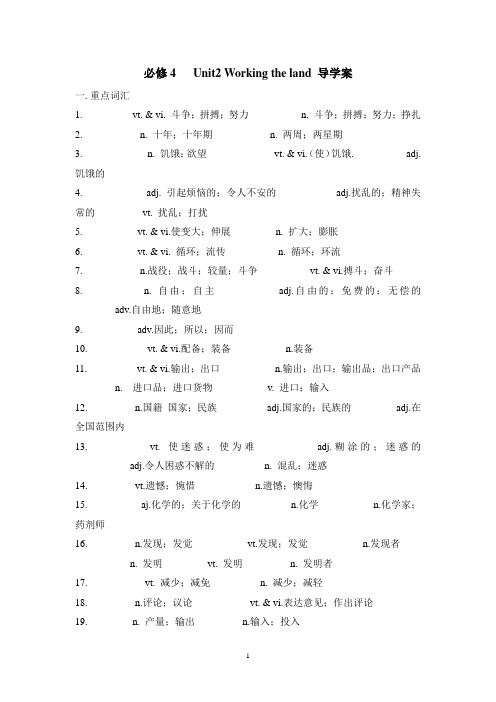
必修4 Unit2 Working the land 导学案一.重点词汇1. _________ vt. & vi. 斗争;拼搏;努力_________ n. 斗争;拼搏;努力;挣扎2.___________ n. 十年;十年期__________ n. 两周;两星期3. ____________ n. 饥饿;欲望___________ vt. & vi.(使)饥饿. ________ adj.饥饿的4. ___________ adj. 引起烦恼的;令人不安的__________adj.扰乱的;精神失常的________ vt. 扰乱;打扰5. __________ vt. & vi.使变大;伸展________n. 扩大;膨胀6. __________ vt. & vi. 循环;流传_________ n. 循环;环流7. ___________n.战役;战斗;较量;斗争_________ vt. & vi.搏斗;奋斗8. ___________n. 自由;自主__________adj.自由的;免费的;无偿的________adv.自由地;随意地9. __________ adv.因此;所以;因而10. ___________ vt. & vi.配备;装备_________n.装备11. _________ vt. & vi.输出;出口_________n.输出;出口;输出品;出口产品________n. 进口品;进口货物__________v. 进口;输入12. _________n.国籍国家;民族_________adj.国家的;民族的________adj.在全国范围内13.___________ vt. 使迷惑;使为难_________adj.糊涂的;迷惑的___________adj.令人困惑不解的_________n. 混乱;迷惑14. _________vt.遗憾;惋惜_________n.遗憾;懊悔15. __________aj.化学的;关于化学的________n.化学_________n.化学家;药剂师16. _________n.发现;发觉_________vt.发现;发觉________n.发现者_________n. 发明________vt. 发明________ n. 发明者17.___________ vt. 减少;减免________n. 减少;减轻18. _________n.评论;议论_________ vt. & vi.表达意见;作出评论19. ________ n. 产量;输出________ n.输入;投入20. _________ n. 工作,职业;占领_______ v. 占据;占领二、重点短语1. 幸亏;由于;因为_____________2. 摆脱;除去______________3. 对…感到满意________________4. 宁愿;宁可_______________5. 逐渐增强;建立;开发________________6. 导致;造成(后果)_________________7.集中(注意力、精力等)于focus _____________8. 使…免受(影响;伤害等);使…不含(有害物)keep…free _______三、根据课文内容填空:1.Indeed, his sunburnt face and arms and his slim, strong body are just like those of millions of Chinese farmers, ________________________________________________.2.Dr Yuan Longping grows ________________________________). In 1974, he became the first ______________in the world to grow rice __________________________.3.At that time, hunger was a__________ problem in many parts of the countryside. Dr Yuan ______________ a way to increase rice harvests ______________________________________。
Book4unit2单词学案Microsoft Office Word 文档 (3)
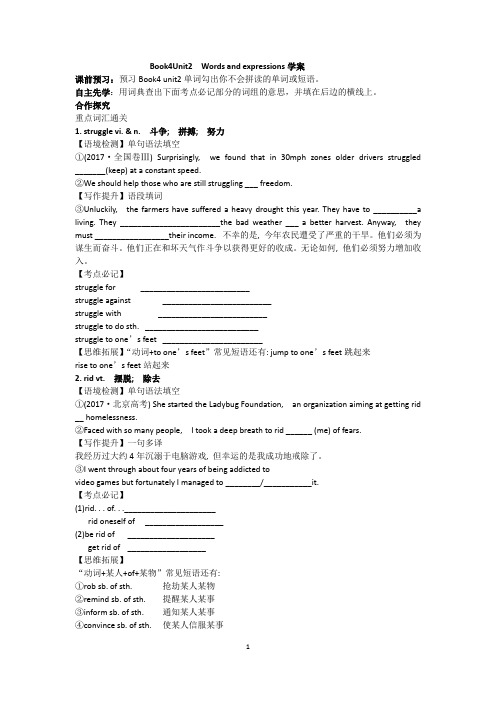
Book4Unit2 Words and expressions学案课前预习:预习Book4 unit2单词勾出你不会拼读的单词或短语。
自主先学:用词典查出下面考点必记部分的词组的意思,并填在后边的横线上。
合作探究重点词汇通关1. struggle vi. & n. 斗争; 拼搏; 努力【语境检测】单句语法填空①(2017·全国卷Ⅲ) Surprisingly, we found that in 30mph zones older drivers struggled _______(keep) at a constant speed.②We should help those who are still struggling ___ freedom.【写作提升】语段填词③Unluckily, the farmers have suffered a heavy drought this year. They have to __________a living. They _______________________the bad weather ___ a better harvest. Anyway, they must _________________their income. 不幸的是, 今年农民遭受了严重的干旱。
他们必须为谋生而奋斗。
他们正在和坏天气作斗争以获得更好的收成。
无论如何, 他们必须努力增加收入。
【考点必记】struggle for _________________________struggle against _________________________struggle with _________________________struggle to do sth. __________________________struggle to one’s feet _______________________【思维拓展】“动词+to one’s feet”常见短语还有: jump to one’s feet跳起来rise to one’s feet站起来2. rid vt. 摆脱; 除去【语境检测】单句语法填空①(2017·北京高考) She started the Ladybug Foundation, an organization aiming at getting rid __ homelessness.②Faced with so many people, I took a deep breath to rid ______ (me) of fears.【写作提升】一句多译我经历过大约4年沉溺于电脑游戏, 但幸运的是我成功地戒除了。
Book 4 unit4 Body Language导学案
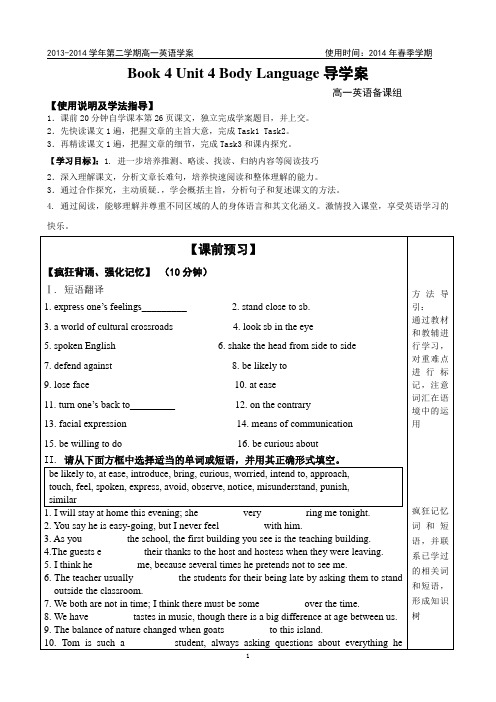
2013-2014学年第二学期高一英语学案使用时间:2014年春季学期Book 4 Unit 4 Body Language导学案
高一英语备课组
【使用说明及学法指导】
1.课前20分钟自学课本第26页课文,独立完成学案题目,并上交。
2.先快读课文1遍,把握文章的主旨大意,完成Task1 Task2。
3.再精读课文1遍,把握文章的细节,完成Task3和课内探究。
【学习目标】:1. 进一步培养推测、略读、找读、归纳内容等阅读技巧
2.深入理解课文,分析文章长难句,培养快速阅读和整体理解的能力。
3.通过合作探究,主动质疑.,学会概括主旨,分析句子和复述课文的方法。
4. 通过阅读,能够理解并尊重不同区域的人的身体语言和其文化涵义。
激情投入课堂,享受英语学习的快乐。
2018版高考英语大一轮复习Book4Unit2ChallengingYourselfⅠ教案(含解析)重庆大学版

Unit 2 Challenging Yourself Ⅰ话题词汇1.aboard prep.上(船、飞机、火车、汽车等)2.accommodation n.住宿;膳宿3.destination n.目的地;终点4.enjoy v.欣赏;享受乐趣;喜欢5.guide n.导游;向导6.luggage/baggage n.行李7.aplaceofinterest名胜8.bestruckby...被……迷住9.haveagoodtrip旅行顺利10.takeapicture拍照话题佳作你对下面这则广告很感兴趣,请按广告的宣传内容写一篇经历故事寄给InternationalYouthClub。
佳作欣赏Oneofthemostunforgettableexperiences Ihaveeverhad wastobeababysitterinmyaunt ’shome when16yearsold.Iwasquiteexcited themomentIthoughtofbeingwithmycousin.Shewasthemostlovelybab yIhadeverseen.AfterIsawherfallasleepquietlyonherbed,IbegantowatchTV.Justafewminuteslater,Iwasinterruptedbyloudcrying.I foundhercrying madly withhersmallmouthopenwidelyandh erskinturningpink.I hadnochoicebutto runtoherto comfort herandmakesurethatherneedsw ereimmediatelymet,inwhichcaseshewouldlaughhappily.Ienjoyandwill cherish theexperiencewithmylittlecousin.名师点睛本文语言简练,条理清楚,使用了一些高级词汇,如hadnochoicebutto,comfort,cherish 等;句型的运用也灵活多变,如定语从句Ihaveeverhad和inwhichcaseshewouldlaughhappily,时间状语从句themomentIthoughtofbeingwithmycousin,“find+宾语+宾语补足语”结构和with复合结构的运用。
Book4 Module1 Unit2 Work With Language教学设计
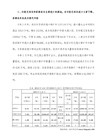
Unit 2
Title
题目
My Birthday
Period
课时
2nd
Type of lesson
3. Check the answers.
Assessment
作业布置:
1. Copy the new words and phrases.
/Topic
模块及话题
Module 1 Age
Unit
单元
Designer
执笔
李维芬
Module
Teaching Procedures
教学过程
Main Points:
1) Introduce vocabulary associated with birthday parties.
2) Raise awareness of sound-spelling correspondence.
3) To introduce the language commonly used in writing a card.
4) To raise awareness of sound-spelling correspondence.
5) To provide practice on reading regular words.
1. Ask pupils to act out the dialogue of Unit 2.
2. Ask pupils to play a game (Listen and do the actions).
3. Present the phrases by saying them and doing the actions at the same time.
Unit2单词讲解学案-高中英语人教版选择性

高一英语导学案BOOK4 unit 2 words studyReading and thinkingKey words1. foundation 基础;基本原则;根据Lianda laid the foundation for every achievement I have made,” Yang Zhenning recalled.“联大为我取得的每一项成就奠定了基础”,杨振宁回忆道。
2. 创建;创办(establishment):the foundation of the first university3.[常用复数]地基;房基:How long will it take to finish digging the foundations? 挖地基4.基金会:Children’s Foundation of China中国儿童基金会[知识拓展]①给…打下基础;为…奠定基础lay the foundation for...eg. Your breakfast choices lay the foundation for your entire day and your long-term health.②无根据的without foundationeg. The universities' concern is not without foundation. 大学的担忧并不是没有根据的found v. 建立;创立;创办;为(房屋等)打基础;注意:find 的过去式和过去分词是found;found的过去式和过去分词是foundedThey invested a lot of money to found a research institute. 建立研究院The house is founded on rock.founder n. 创办人;创立者2.politics n. 政治,政治事务(活动) politician n. 政治家,从政者politicise vt. 使政治化,使具有政治性3.located adj 位于be located in/on = be situated in/on 坐落于城市,位于中国东部沿海地区。
人教版(精通)三年级上英语Unit2导学案
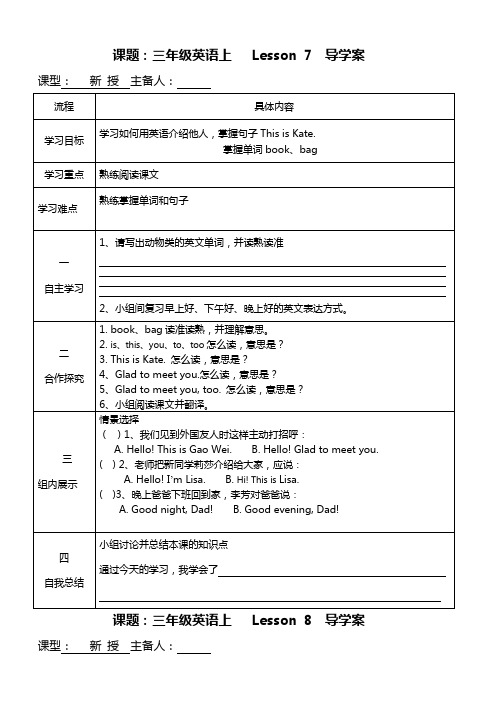
课题:三年级英语上 Lesson 7 导学案课型:新授主备人:流程具体内容学习目标学习如何用英语介绍他人,掌握句子This is Kate.掌握单词book、bag学习重点熟练阅读课文学习难点熟练掌握单词和句子一自主学习1、请写出动物类的英文单词,并读熟读准2、小组间复习早上好、下午好、晚上好的英文表达方式。
二合作探究1. book、bag读准读熟,并理解意思。
2. is、this、you、to、too怎么读,意思是?3. This is Kate. 怎么读,意思是?4、Glad to meet you.怎么读,意思是?5、Glad to meet you, too. 怎么读,意思是?6、小组阅读课文并翻译。
三组内展示情景选择()1、我们见到外国友人时这样主动打招呼:A. Hello! This is Gao Wei.B. Hello! Glad to meet you. ( ) 2、老师把新同学莉莎介绍给大家,应说:A. Hello! I’m Lisa.B. Hi! This is Lisa.( )3、晚上爸爸下班回到家,李芳对爸爸说:A. Good night, Dad!B. Good evening, Dad!四自我总结小组讨论并总结本课的知识点通过今天的学习,我学会了课题:三年级英语上 Lesson 8 导学案课型:新授主备人:流程具体内容学习目标学习如何用英语介绍他人及初次见面的人如何打招呼,掌握句子This is Kate. Nice to meet you!掌握单词pen、pencil学习重点熟练阅读课文学习难点熟练掌握单词和句子一自主学习1、请写出书和书包的英文单词,并读熟读准2、小组间复习第七课学的见面打招呼的英文表达句子二合作探究1. pen、pencil读准读熟,并理解意思。
2. is、this、hello、to、too、nice、meet怎么读,意思是?3. This is Gao Wei. 怎么读,意思是?4、Nice to meet you.怎么读,意思是?5、Nice to meet you, too. 怎么读,意思是?6、小组阅读课文并翻译。
人教版初二八年级上册英语Unit 2第二单元导学案教学案讲学稿

人教版初二八年级上册英语Unit 2第二单元导学案教学案讲学稿Unit 2第二单元导学案教学案讲学稿Unit 2What’s the matter?Section A一、教师寄语Reading is to the mind what exercise is to the body.读书养心,锻炼健身。
二、学习目标知识目标:Words: matter; have; cold; stomachache; sore; back; arm; ear; eye; foot; hand; head; leg; mouth; neck; nose; stomach; tooth; throat; toothache; fever; rest; honey; dentist; should; headache; shouldn’t Phrases: have a cold have a sore throat have a fever see a dentist Sentences:1. What’s the matter I have a cold.2. I have a headache/stomachache/toothache/sore back/sore throat.3. You should go to bed/drink some water.能力目标: Enable the students to talk about health problems and give advice with the language points.感情目标: Help the students learn how to talk about health problems and give advice on that with the language points.三、教学重、难点Talk about your health.and give advice.四、学习过程1预习导学或自测Ⅰ.Students look at the pictures on the blackboard and learn the new words about the parts of the body.1. b______2. n_____3. he_____4. ha_____5. ea_____6. ey_____7. f______ 8. m_____ 9. ne_____10. a______11. s_______ 12. l_____2.自主学习1.看医生/牙医2.感冒3.患牙痛4.患头痛5.发烧6.躺下休息7.喝大量水 8.喝热蜂蜜茶9.有压力10.保持健康3.合作探究.完成表格后对话。
凤凰职教book4Unit2教案
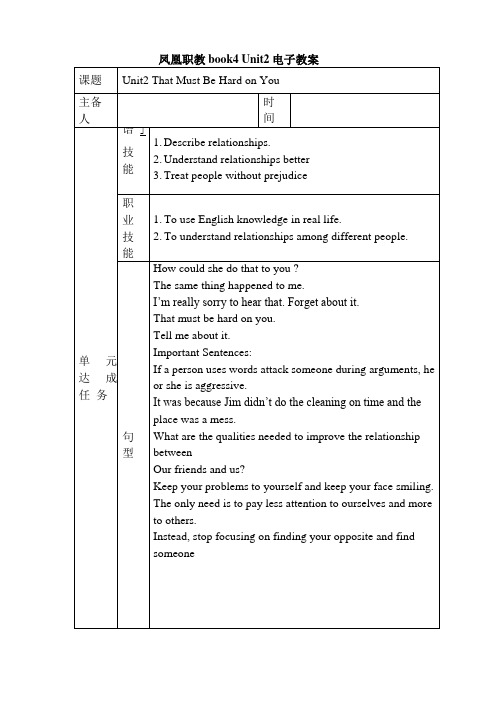
凤凰职教book4 Unit2电子教案Take students to read the picute of Parti and guesswhat’s happening to Jim.Listen to the conversation and circle what Jim is upset about.Then correct the answer.Listen again and complete the Part2 True or False.And tell the reasons to the class.Try to encourage to complete the part3 by themselves by using theinformation they have got in the before Twice’s listening.教学反思Stepl RevisionHave a dictaionSome important words: aggressive, gentle,patient,amazing, fun, bossy .....Students can describe their partners by the words we have learned last class.Step2 ListeningFirst listening:Take students to learn the three sentences and to know their chinese meanings.Listen to the tape recorder and find out the problem mentioned in each item.(Tell students to catch the key information when they are listening and take some notes.)Second Listening:Read the five sentences and try to complete the conversations with them.Ask two students to practise the conversations .Listen again and check their answers.some useful phrases:talk behind my back, all sorts of lies, ask him for help. Step3 Conversation StrategUnderstandingGenuine compassionMake you be in a similar situationBe a good listenerStep4. Work with a partner. Role-play the following e the conversation strategy in Acivity5. Situation 1: ......Situation 2: ......Situation 3: ......教学反思Ask some students to read the passageA one by one.Students can express that how to be friendly and charming by their own words. Complete the exercise 2 and check the answers with others.Step3 DiscussionWhat else can be done to improve friendships?Divide the students into several groups and talk with each other.教学反思different from themselves is a great relationship match. Be different from 与。
2015届高三英语人教新(通用)总复习导学案:Book 2 Unit 4 Wildlife protection
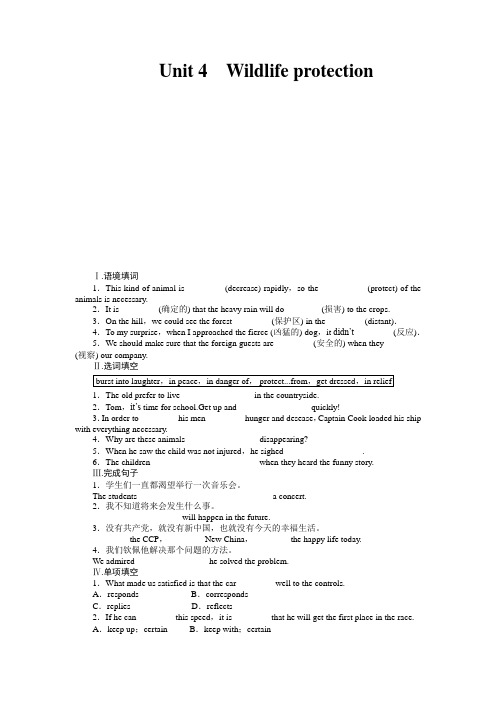
Unit 4Wildlife protectionⅠ.语境填词1.This kind of animal is ________ (decrease) rapidly,so the __________ (protect) of the animals is necessary.2.It is ________ (确定的) that the heavy rain will do ________(损害) to the crops.3.On the hill,we could see the forest ________ (保护区) in the ________ (distant).4.To my surprise,when I approached the fierce (凶猛的) dog,it didn’t ________ (反应).5.We should make sure that the foreign guests are ________ (安全的) when they ________ (视察) our company.Ⅱ.选词填空burst into laughter,in peace,in danger of,protect...from,get dressed,in relief1.The old prefer to live ________________ in the countryside.2.Tom,it’s time for school.Get up and ________________ quickly!3.In order to ________ his men ________ hunger and desease,Captain Cook loaded his ship with everything necessary.4.Why are these animals ________________ disappearing?5.When he saw the child was not injured,he sighed ________________.6.The children ________________________ when they heard the funny story.Ⅲ.完成句子1.学生们一直都渴望举行一次音乐会。
Book4 Unit2知识梳理学案
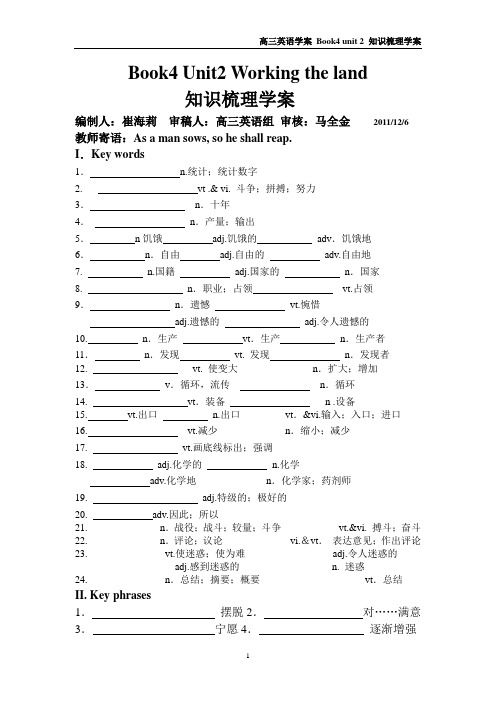
Book4 Unit2 Working the land知识梳理学案编制人:崔海莉审稿人:高三英语组审核:马全金2011/12/6教师寄语:As a man sows, so he shall reap.I.Key words1.n.统计;统计数字2. vt .& vi. 斗争;拼搏;努力3.n.十年4.n.产量;输出5.n饥饿adj.饥饿的adv.饥饿地6.n.自由adj.自由的adv.自由地7. n.国籍adj.国家的n.国家8. n.职业;占领vt.占领9.n.遗憾vt.惋惜adj.遗憾的adj.令人遗憾的10. n.生产vt.生产n.生产者11.n.发现vt. 发现n.发现者12. vt. 使变大_______________n.扩大;增加13.v.循环,流传n.循环14. vt.装备n .设备15. vt.出口n.出口_________vt.&vi.输入;入口;进口16. vt.减少_____________ n.缩小;减少17. vt.画底线标出;强调18. adj.化学的n.化学adv.化学地_____________n.化学家;药剂师19. adj.特级的;极好的20. adv.因此;所以21. ______________n.战役;战斗;较量;斗争___________ vt.&vi. 搏斗;奋斗22. ______________n.评论;议论____________ vi.&vt.表达意见;作出评论23. _______________vt.使迷惑;使为难________________ adj.令人迷惑的_________________adj.感到迷惑的________________ n. 迷惑24. _____________ n.总结;摘要;概要_____________________vt.总结II. Key phrases1.摆脱2.对……满意3.宁愿4.逐渐增强5.导致6.集中在……上7.使……免受(影响、伤害等)8.寻找9.太多10. 希望11. 过去常常12. 坚持III. Key sentences.1. ,what do you do to grow them?如果这样的话,你做了些什么来种植这些植物?2. Dr. Yuan Longping grows super hybrid rice. 袁隆平博士种植的是被称为“超级杂交水稻”的稻种。
8上 Unit 2 导学案及背默任务

八年级上册背默任务Unit 2(背诵稿)班级:姓名:Welcome to the unit1.Because we’re cleverer than people. 因为我们比人更聪明。
2.They have to work harder. 他们不得不更加努力。
3.Do you have any plans for the weekend? 这个周末你有什么计划吗?4.Shall we go together? 我们一起去好吗?5.I’d love to, but the school football team will practise this Saturday.我想去,但是学校足球队这个周六要练习。
Reading(I)1.Among all my subjects, I like French best. 在我所有的科目中,我最喜欢法语课。
2.Learning foreign languages is fun. 学外语是有趣的。
3.I often read more books than my classmates. 我经常比我的同学们读的书更多。
4.Near the end of the week, we discuss the books with our classmates in class.在每周快结束时,我们和同学们在课上谈论书。
5.Time seems to go faster when we are reading interesting books.当我们阅读有趣的书时,时间似乎过得更快。
Reading(II)1.Every Monday, I go to the Buddy Club. 每周一,我去好朋友俱乐部。
2.He often listens carefully to my problems and offers me help.他经常仔细倾听我的问题并给我提供帮助。
人教新起点二年级下册英语-Unit 4 Lesson 2导学案

人教新起点二年级下册英语-Unit 4 Lesson 2导学案一、学习目标1.学习掌握单词:count, young, old, dance,了解它们的意思和拼写。
2.能够使用英语句子简单谈论年龄和能力。
3.能够参与英语的对话,和其他同学交流。
二、课前准备1.学习和复习上一课时的学习内容,包括单词、句型等。
2.预习本节课的学习内容,了解本节课的单词和句型。
3.准备好课本和笔记工具。
三、课堂学习1. 钟爱动作在本节课前,老师可提前准备一个钟表,让同学们依次转动指针,同学们在指针指向自己时,说出一个动作,其他同学都要跟随这个动作。
这个环节的目的是让孩子们在轻松的气氛下练习英语的口语表达。
2. 听力练习播放录音并跟随录音,读出已经学过的单词和句型。
录音内容:A: How old are you, Daming?B: I’m eight years old. How old are you?A: I’m eleven. Can you count to twenty in English?B: Yes, I can. Can you dance?A: No, I can’t. Can you dance?B: Yes, I can.练习内容:1.听录音并跟读:How old are you, Daming?I’m eight years old. How old are you?I’m eleven.Can you count to twenty in English?Yes, I can.Can you dance?No, I can’t.Can you dance?Yes, I can.2.做完听力练习后,同学们可以互相交流自己和伙伴的年龄,以及是否能够跳舞。
3. 语言点梳理1. 年龄的表达询问别人的年龄:•How old are you?•What’s your age?回答自己的年龄:•I’m (number) years old.回答别人的年龄:•He/She is (number) years old.2. 能力的表达询问别人的能力:•Can you (动作)?回答自己的能力:•Yes, I can.•No, I can’t.回答别人的能力:•He/She can (动作)。
2015届高三英语人教新(通用)总复习导学案:Book 4 Unit 2 Working the land
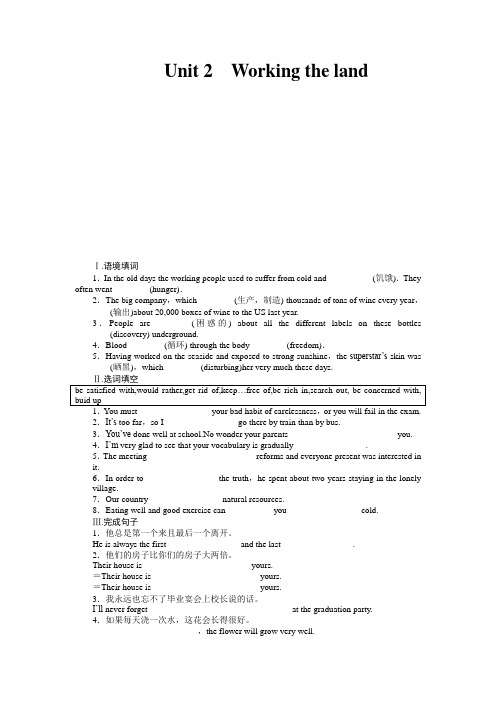
Unit 2Working the landⅠ.语境填词1.In the old days the working people used to suffer from cold and __________(饥饿).They often went ________(hunger).2.The big company,which ________(生产,制造) thousands of tons of wine every year,________(输出)about 20,000 boxes of wine to the US last year.3.People are ________(困惑的) about all the different labels on these bottles ________(discovery) underground.4.Blood ________(循环) through the body ________(freedom).5.Having worked on the seaside and exposed to strong sunshine,the superstar’s skin was ________(晒黑),which ________(disturbing)her very much these days.Ⅱ.选词填空be satisfied with,would rather,get rid of,keep…free of,be rich in,search out, be concerned with, buid up1.You must ________________ your bad habit of carelessness,or you will fail in the exam.2.It’s too far,so I ________________ go there by train than by bus.3.You’ve done well at school.No wonder your parents ________________________ you.4.I’m very glad to see that your vocabulary is gradually ________________.5.The meeting ________________________ reforms and everyone present was interested in it.6.In order to ________________ the truth,he spent about two years staying in the lonely village.7.Our country ________________ natural resources.8.Eating well and good exercise can __________ you ________________ cold.Ⅲ.完成句子1.他总是第一个来且最后一个离开。
必修4Unit2教案:阅读策略指导

必修4 Unit 2教案:阅读策略指导英语阅读是学习英语的重要组成部分,而阅读能力的提高又需要阅读策略的指导。
Unit 2的教学内容涵盖许多丰富的阅读材料,不仅可以帮助学生丰富知识,提高英语水平,还可以帮助学生学习和理解不同类型文本的阅读策略,从而提高自己的阅读能力。
本文将从教师和学生两方面探讨必修4 Unit 2教案的阅读策略指导。
一、教师角度作为学生的引领者,英语教师要善于运用各种阅读策略指导学生进行英语阅读,培养学生的阅读能力。
在Unit 2的教学中,教师应关注以下几个方面:1.了解不同类型阅读材料的阅读策略在Unit 2的教学中,有包括新闻报道、科技文章、历史文章、文学作品等多种类型的阅读材料。
教师需要了解并熟悉不同类型阅读材料的特点,从而针对性地指导学生选择和运用不同的阅读策略。
2.深入分析文章,传授阅读技巧教师在引导学生进行阅读时,可以有意识地帮助学生深入分析文章,全面了解其中的内容和结构,并传授相关的阅读技巧,如预测、扫读、略读、细读等,让学生在阅读过程中更加得心应手。
3.培养不同阅读策略的组合使用英语阅读策略的运用并不是孤立的,教师需要引导学生掌握并合理运用不同的阅读策略。
例如,学生在进行细读时,可以结合预测和扫读等技巧,更好地把握文章的重点。
二、学生角度英语阅读能力的提高关键在于阅读策略的运用,因此学生需要认真学习和掌握各种阅读策略,课堂时间内的指导是为学生后续的阅读打下基础。
学生在进行英语阅读时,可以从以下几个方面入手:1.明确阅读目的,合理安排时间在进行阅读时,学生首先需要明确阅读目的,从而合理安排时间。
如果目的是快速浏览整篇文章,那么可以运用扫读技巧;如果目的是查找某一特定信息,那么可以运用略读技巧;如果目的是全面理解和掌握文章,那么可以进行细读。
2.发现关键词和主旨句在阅读文章时,学生需要及时发现关键词和主旨句,并根据关键词和主旨句来理解文章中的内容。
这样能帮助学生更好地理解文本,把握文章的核心内容。
M4U2导学案
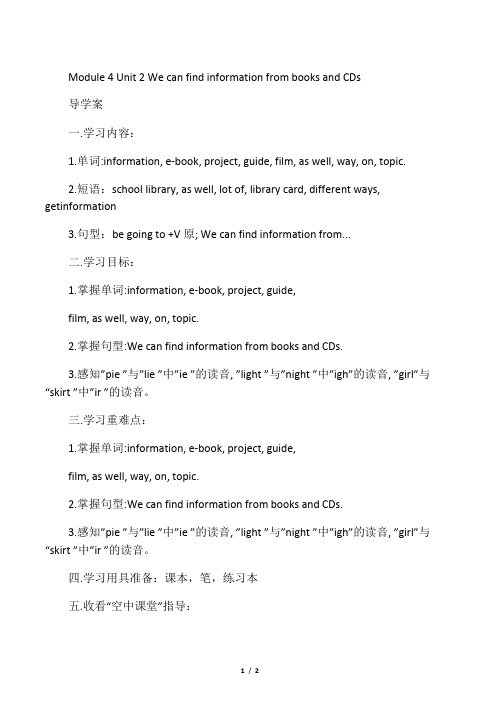
Module 4 Unit 2 We can find information from books and CDs导学案一.学习内容:1.单词:information, e-book, project, guide, film, as well, way, on, topic.2.短语:school library, as well, lot of, library card, different ways, getinformation3.句型:be going to +V原; We can find information from...二.学习目标:1.掌握单词:information, e-book, project, guide,film, as well, way, on, topic.2.掌握句型:We can find information from books and CDs.3.感知”pie ”与”lie ”中”ie ”的读音, ”light ”与”night ”中”igh”的读音, ”girl”与“skirt ”中”ir ”的读音。
三.学习重难点:1.掌握单词:information, e-book, project, guide,film, as well, way, on, topic.2.掌握句型:We can find information from books and CDs.3.感知”pie ”与”lie ”中”ie ”的读音, ”light ”与”night ”中”igh”的读音, ”girl”与“skirt ”中”ir ”的读音。
四.学习用具准备:课本,笔,练习本五.收看“空中课堂”指导:同学们按时通过老师发的二维码或链接上课,上课时间认真听讲,及时做笔记,按授课老师的要求做好每个环节。
- 1、下载文档前请自行甄别文档内容的完整性,平台不提供额外的编辑、内容补充、找答案等附加服务。
- 2、"仅部分预览"的文档,不可在线预览部分如存在完整性等问题,可反馈申请退款(可完整预览的文档不适用该条件!)。
- 3、如文档侵犯您的权益,请联系客服反馈,我们会尽快为您处理(人工客服工作时间:9:00-18:30)。
Unit2, Book4 Working the land 导学案一、目标词汇:struggle, disturbing, expand, therefore, export, regret, reduce, comment, hunger, disturbing二、重点词汇:for the past five decades 在过去的50年里(与现在完成时连用)Search for寻找, thanks to 多亏、幸亏,rid…of 摆脱、除去,be satisfied with…对…感到满意,would rather do sth 宁愿做某事, with the hope of…带着…的希望,confuse…with…把…和… 弄混淆, regret doing sth后悔做某事, build up逐渐增强;建立,keep…free from/of 使…免受(影响;伤害等)三、重点句型:1. If so, what did you do to grow them? 如果你种过植物,那么为了种它们你都做了什么?2. His sunburnt face and arms and his slim, strong body are just like those of millions of Chinese farmers, for whom he has struggled for the past five decades.他那被太阳晒得黝黑的面庞和手臂,以及他那瘦削而又结实的身体,就跟其他千百万的农民一样,过去50年来,他一直在努力帮助他们。
3. Dr Yuan Longping grows what is called super hybrid rice.袁隆平博士种植的水稻被称为“超级杂交水稻“。
4. This special strain of rice makes it possible to produce one-third more of the crop in the same fields.这种特殊的稻种使得相同的田地多收获三分之一的产量。
5. As a young man, he saw the great need for increasing the rice output. 年轻时,他就看到了稻田6. Thanks to his research, the UN has more tools in the battle to rid the world of hunger. 多亏了他的研究,联合国在消除世界饥饿的战斗中又多了些方法。
7. Using his hybrid rice, farmers are producing harvests twice as large as before. 用他的杂交水稻种子,农民们种出的粮食比以前多了一倍。
8. Dr Yuan is quite satisfied with his life.袁博士很满意他的生活9.He would much rather keep time for his hobbies.他宁愿把时间花在自己的爱好上。
10. Dr Yuan awoke from his dream with the hope of producing a kind of rice that could feed more people. 袁博士从梦中醒来,希望能种植一种可以养活更多人的水稻。
四、语法归纳:动词-ing形式作主语和宾语一)动词-ing形式做主语1、现在分词做主语表示事物化、抽象化的概念。
强调:现在分词做主语时谓语一律用单数。
Eg: Talking is an art.Eg: Learning English well is not easy.2、常用v.-ing形式做主语的句型有(v.-ing形式放在末尾,it做形式主语)It’s no good/use doing sth. 做…..是没有用的It’s useful/useless doing 做.....是有/没有用的There is no ..... doing sth. 做.....是有/没有用的There is/was nothing worse doing... 没有比做…更糟糕的了It is/was a waste of time doing…做…是浪费时间的It is/was hardly worth doing…做…是不值得的Eg: It is no use crying after knowing the result.Eg: It is no good playing games.3、动词不定式,动名词都可以做主语,区别是:动词不定式多指某次具体行为或特定的行动,也可表示经常的行为动名词表示一般或经常的行为(抽象而时间观念不强)。
Learning English is not easy.指学习英语这件事。
没有指具体的学习行为。
To learn English grammar is not easy.指具体的学习语法这件事二)动词-ing形式做宾语1、作动词的宾语某些动词后只能用动词-ing形式作宾语,不能用不定式: allow \ cannot help\ consider\ risk\ suggest\ forbid\ protect```(from)阻止\ admit\ advise\ allow\ avoid\ delay推迟\ enjoy\ escape逃脱\ finish\ give up\ imagine\ mind\ practice\Eg: I tried to avoid making mistakes.Eg: I suggest having a rest.2、作介词的宾语:是一些固定的短语搭配:be/ get/ become used to习惯于, look forward to, insist on, be succeed in, be fond of, be interested in, be worth, devote…to, stick to, lead to.Eg: The book is worth reading.Eg: I am used to getting up early.五、习题链接:一)选择题:1. I like __________ very much, but I don’t like _________ this morning.A. swimming, swimmingB. to swim, to swimC. swimming, to swimD. to swim, swimming2. I’m sorry I forgot _______ your dictionary. Let’s borrow one from Li Ming.A. to takeB. takingC. to bringD. bringing3. ---“What can we do to help Li Hai.”---“All we can do is to try __________ that he ought to study more.”A. making him to realizeB. making him realizeC. to make him realizeD. to make him to realize4. He finished his homework, then he went on __________ a letter.A. writeB. writingC. withD. to write5. You didn’t need __________ him the news; it just made him sad.A. tellingB. tellC. to tellD. that you would tell6. She enjoys __________ light music.A. to hearB. hearingC. listening toD. to listen to7. If you keep __________ English, you can learn English well.A. practicing speakB. practicing speakingC. practicing to speakD. to practice spoken8. We are considering _________ a new plan.A. makingB. being madeC. to makeD. to have made9. She __________ the key.A. admitted takingB. admitted takingC. admitted having takenD. admitted to have taken10. Why have they delayed __________ the new school?A. openingB. to openC. having openedD. to have opened二)用括号内的动词的适当形式填空。
1. —What made Jane so upset?—__________(lose) the ring her husband bought her for her birthday.2. Once your business becomes international, ________(fly) constantly will be part of your life.3. Do you think it of any use ________(argue)with him any more? We are wasting our time _______ (try)to persuade him to give up the idea.4. _________(find)a job in such a big company has always been beyond his wildest dream.5.—Maybe you’ve forgotten _______(post)my letter.— How could I? I remember _______(put) the letter into the letter box.。
